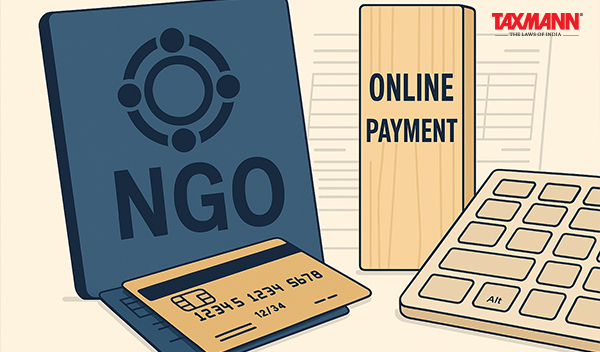FCRA Compounding – NGOs With Expired Registration Can Pay Online
- Blog|News|FEMA & Banking|
- 2 Min Read
- By Taxmann
- |
- Last Updated on 16 May, 2025

Public Notice. II/21022/58(10)/12/2025-FCRA(MU); Dated: 14.05.2025
1. Background
Under Rule 12(5) of the Foreign Contribution (Regulation) Rules, 2011, an NGO whose FCRA registration has lapsed cannot receive or use any foreign contribution. Until now that blanket embargo also blocked payment of compounding penalties and statutory fees, trapping many entities in a compliance catch-22.
2. What the New MHA Public Notice Says
- Document – Public Notice No. 11/21022/58(10)/12/2025-FCRA(MU)
- Date – 14 May 2025
- Authority – Exercising powers under Section 50 of the FCRA, 2010
- Relief Granted – NGOs/associations whose FCRA registration has expired may now pay their compounding penalty and government fees directly from the designated FCRA account with SBI (New Delhi Main Branch) via the FCRA online portal’s new “SBI Branch Payment” option.
3. Step-by-Step Payment Guide for NGOs
- Log in at https://fcraonline.nic.in.
- Navigate to ‘Compounding’ → ‘Make Payment’.
- Choose “SBI Branch Payment” as the mode.
- Enter the File No. of the compounding order and verify amount due.
- Confirm debit from your designated SBI-NDMB FCRA account.
- Download the e-receipt and keep it with your compounding order for records.
4. Practical Impact
- Unblocks the compliance loop—NGOs can now clear penalties even after licence expiry, paving the way for fresh registration or renewal.
- No change to other restrictions—receiving or spending foreign funds for programme activities remains barred until renewal is granted.
- Digital traceability—using the portal/SBI route ensures an auditable trail, reducing manual verification for MHA.
5. Immediate Compliance Checklist
- Verify that your FCRA SBI account is active and KYC-compliant.
- Ensure you pay only the compounding amount shown on the portal.
- Retain the portal receipt and bank debit advice in your FCRA file.
- Apply for renewal (Form FC-3) promptly if you intend to resume foreign-funded activities.
6. Key Takeaways
- Targeted relaxation, not a blanket waiver – The permission extends solely to compounding-related outflows.
- Digital-first procedure – Payments must flow through the online portal using the designated SBI pathway.
- Stay within the four corners – Any other utilisation of the FCRA account during the expired-status window remains illegal.
By carving out this narrow but crucial exception, the MHA has removed a major procedural bottleneck, enabling NGOs to regularise past defaults and work toward restoring their FCRA status without breaching the Act.
Click Here To Read The Full Notice
Disclaimer: The content/information published on the website is only for general information of the user and shall not be construed as legal advice. While the Taxmann has exercised reasonable efforts to ensure the veracity of information/content published, Taxmann shall be under no liability in any manner whatsoever for incorrect information, if any.

Taxmann Publications has a dedicated in-house Research & Editorial Team. This team consists of a team of Chartered Accountants, Company Secretaries, and Lawyers. This team works under the guidance and supervision of editor-in-chief Mr Rakesh Bhargava.
The Research and Editorial Team is responsible for developing reliable and accurate content for the readers. The team follows the six-sigma approach to achieve the benchmark of zero error in its publications and research platforms. The team ensures that the following publication guidelines are thoroughly followed while developing the content:
- The statutory material is obtained only from the authorized and reliable sources
- All the latest developments in the judicial and legislative fields are covered
- Prepare the analytical write-ups on current, controversial, and important issues to help the readers to understand the concept and its implications
- Every content published by Taxmann is complete, accurate and lucid
- All evidence-based statements are supported with proper reference to Section, Circular No., Notification No. or citations
- The golden rules of grammar, style and consistency are thoroughly followed
- Font and size that’s easy to read and remain consistent across all imprint and digital publications are applied



 CA | CS | CMA
CA | CS | CMA
